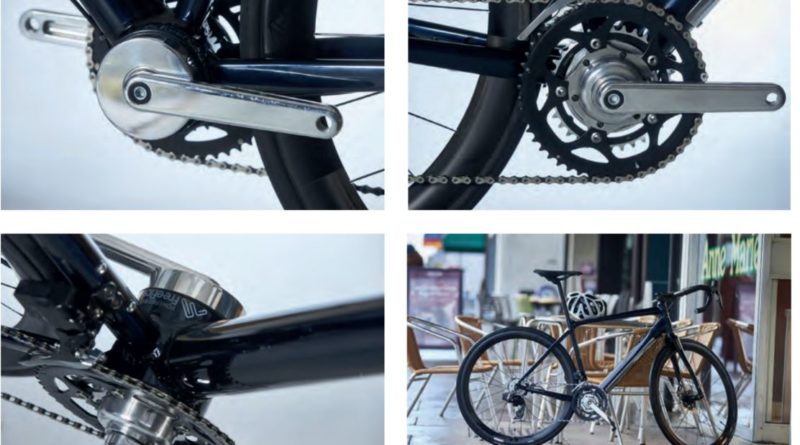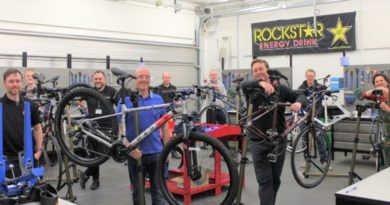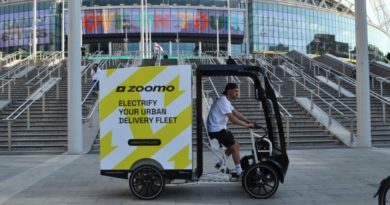Freeflow Technologies seeks to plug shortfall for electric bike motors
What better place to develop electric bike motors than Scotland? Having followed the Freeflow Technologies journey for many years, CI.N sits down with Managing Director David Hemming as working samples make their way into the hands (and frames) of bike makers for the first time…
Nestled just below Glasgow and an hour south of Loch Lomond and the Trossachs National Park Freeflow Technologies has now spent nearly four years designing, refining, testing and further refining an electric motor system that has been eagerly awaiting in the cycle trade. As Q4 began a frantic effort to place the first working prototype within a special bike began alongside Welsh wooden bike specialist Twmpa Cycles.
From taking a briefing in September, the bike label’s engineers got to work adapting their Beech wood platform to cater for a motor system for the first time. By the time November’s Rouleur Live event rolled around the sample bike was turning heads. Nestled behind a 36 tooth chainring, the Freeflow motor was barely visible at the driveside without close inspection. The exclamation “that’s not an e-bike, is it?” is becoming more common nowadays, but with the consumer crowd filtering through the Bloomsbury venue it was heard often by Twmpa’s booth.
 By the time you are reading this the system will be in production and likely have passed its final validation testing with a view to enabling manufacturers to purchase the system from February. At a time when the order books with some major motor suppliers are essentially closed, Freeflow’s appeal to UK bike designers in particular will naturally grow.
By the time you are reading this the system will be in production and likely have passed its final validation testing with a view to enabling manufacturers to purchase the system from February. At a time when the order books with some major motor suppliers are essentially closed, Freeflow’s appeal to UK bike designers in particular will naturally grow.
“Year-to-year we have gone from 35 to 70 brands interested. At present its agile brands that like to create something unique in the marketplace, but there are larger conversations in play too with those whose heads have been turned by the spec sheet. The Starling Pylon full- suspension build has just broken cover alongside the Twmpa bike, but samples are out with plenty more,” said UK MD David Hemming.
Indeed, other UK designed labels passing through the Rouleur event privately confirmed they were teeing up tests, drawn in by a number of perks ranging product weight, the small footprint taken by the system and local serviceability.
“For the mountain bike brand, for example, there’s absolutely not compromise in the chainstay length, wheelbase and thus ride characteristics possible if the frame is well thought out. Yu can keep pivot points where you desire to keep them. All in the diameter is 117mm, which as demonstrated sits inside a 36-tooth ring,” explains Hemming.
Where product testing is concerned Freeflow has worked around high-stress usages for its system, making it ideal for off road applications, but nonetheless at home in the city.
On the rigorous testing regime Hemming says “We have run a motor to over 10,000 kilometres simulated use with no additional cooling. That turned out to be 12 days of constant riding, where it ran under high load. In fact, it was overclocked and climbed three Everests in the process at 26,500 metres. This generation’s product is still over engineered a bit, even with the low size.”
The system was smaller in the first generation too, measuring 80mm initially, but Freeflow opted to bolster the strength, still managing to deliver the micro-motor with a weight of 3.5 kilograms.
The engineering team behind the patented drive is stacked both with engineers and cyclists. Aside from having Williams Formula 1 as an investor, which further helps the label tinker and test, the team has engineering expertise in the form of former Dyson CTO/COO Neil Edwards, a former head of deign at Jaguar LandRover and a technical director formerly with Tata Steel. As we head through winter a team of assembly engineers will join the ranks.
“We hope to assemble 2,000 transmissions in Scotland next years,” says Hemming of the near-term ambition. “The idea in the next few years is to work with brands closely, so that each has access to our team. Every product that goes out we will have an after sales strategy to make sure this product evolves along- side agile innovators in the marketplace. Within five years I’d like to see further assembly in Europe to give us a local foothold with brands emerging there.”
That feeling of quality control and high local serviceability will run through to shop level too. Freeflow has built its system to be installed by any trained mechanic in just over ten minutes and thus bike shop servicing is baked into the future plans. All shops will need is a specialist drive side cap tool and to undo two allen key bolts on the electric bike motors to gain access.
As for the software, that’s going to evolve steadily too thanks to over the air update capability. Hemming concludes: “We are now open to brands calling and we’ll have eight demo bikes by end of the year, plus we’re happy to visit brands anywhere in UK. We want to be known as the flexible e-Bike brand. In time we will create a dedicated app for the phone, but it’s accessible as it stands on most devices and over the air updates already in place already. For manufacturers bringing different ideas to the table, or perhaps those in areas with differing regulations we can do region specific updates, for example. The anonymised data fed back to the cloud tells us how bikes are being used so we can continually improve. An option already in place is the email service reminder which prompts a visit to the local stores, along with diagnostics to the mechanic.”
Freeflow Technologies has just secured fresh funding to ramp up production of its electric bike motors, which you can read about here.



